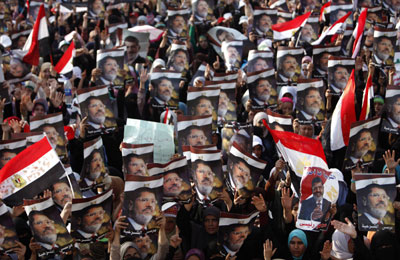
Mursi's fall comforts Saudis, disconcerts Qatar
Doha, July 12, 2013
The $12 billion in aid Saudi Arabia, the UAE and Kuwait offered Egypt this week showed their delight at the army's ousting of President Mohamed Mursi in a reversal for Islamists empowered by the Arab ferment of 2011, said experts.
It also marked a recalibration of power among Gulf states which, with the notable exception of Qatar, had viewed the Arab uprisings as catastrophic for regional stability and feared the Muslim Brotherhood would use its domination of Egypt to push a radical, Islamist agenda in their own backyard, they stated.
Qatar, however, saw support for the Muslim Brotherhood as a means to project its influence in the Middle East, and gave Egypt $7 billion in aid during the movement's year in power.
"I suspect the Qataris will draw back somewhat," said Robert Jordan, a former US ambassador to Riyadh. "Their infatuation with the Muslim Brotherhood has probably been dampened. They're likely to come around to a position closer to the Saudis."
Saudi Arabia in particular was alarmed by the popular unrest that toppled Egypt's Hosni Mubarak and Tunisia's Zein al-Abidine Ben Ali, and rippled through Yemen and other countries.
But most Gulf rulers had fewer qualms about rebellions against Libya's leader Muammar Gaddafi and Syria's Bashar al-Assad, whose links with Shi'ite Iran and Lebanon's Hezbollah movement had long antagonised US-backed GCC states.
Saudi Arabia and Qatar, which has challenged Riyadh's traditional leadership in recent years, were broadly aligned on support for rebels in Syria and Libya, but they bitterly disagreed over their attitude to Islamist groups. Now that argument appears to be over - at least for now.
Doha insiders say it is too early to judge Qatar's reaction to the crisis unfolding in Egypt, but they say the new emir may consider reducing his wealthy country's support for the Muslim Brotherhood and playing a less prominent regional role.
"They have admitted that there were some flaws in their Egypt strategy," said a Doha-based source who has advised the Qatari government and who asked not to be named.
"Their intervention was seen as overly reflexive support of the (Mursi) government without adequately taking into account the will of the people. The way it was handled has caused them some problems, and they have acknowledged that," he said.
For Saudi Arabia, the Brotherhood's fall was sweetened by the decisive intervention of an Egyptian military with ties to Gulf states that flourished under Mubarak. Army chief General Abdel Fatteh al-Sisi was once a military attache in Riyadh.
"He has long experience there and long ties to not only the Saudi military, but also the political leadership," said Jordan.
Saudi Arabia and the UAE publicly insist they do not comment on other states' internal affairs, but both rapidly broadcast congratulatory messages to Egypt's new interim leader, tacitly signalling their hostility to the Muslim Brotherhood.
"The problem with the Brotherhood is their ideology has no borders," said Abdullah al-Askar, chairman of the foreign affairs committee of Saudi Arabia's Shoura Council, a body King Abdullah appointed to debate policy and advise the government.
"They don't believe in national identity, but they believe in the identity of the Islamic nation. They have their fingers in different states in the Gulf," he said.
That concern was manifest in the trial in Abu Dhabi of 94 Emiratis accused of plotting to overthrow the government on behalf of the Egyptian Muslim Brotherhood. Their sentences were announced a day before the tanks rolled in Cairo last week.
While Kuwait's ruling family shares Saudi and UAE concerns about the Brotherhood, its stance is complicated by the presence of Islamists linked to the movement in its parliament.
As a result it has been less vocal than other Gulf states in criticising the Brotherhood after the Arab uprisings and has left fundraising for Syrian rebels largely to private citizens.
Like the Brotherhood, most Gulf states follow strict versions of Islam, but while the Islamist movement preaches political activism, Gulf clerics mostly espouse a doctrine of support for traditional rulers and oppose radical change.
In Doha, the question now is how far the new emir, Sheikh Tamim bin Hamid al-Thani, might retreat from Qatar's alliance of convenience with the Middle East's sturdiest Islamist movement.
Qatar's support for the Brotherhood, including sheltering its sympathisers, arming its brigades in Syria and, some say, guiding the editorial policy of its Arabic-language Al Jazeera television station, has irritated Saudi Arabia and the UAE.
"They (the Qataris) think soft power comes via the Brotherhood, via Al Jazeera television but this is dangerous," said the Saudi Shoura Council's Askar, saying he was speaking for himself and not for the kingdom.
He said the Qataris "use the Brotherhood for political reasons", without belonging to the movement themselves.
There is no outward sign yet of Qatar changing its policy.
Sheikh Youssef al-Qaradawi, a prominent Doha-based Egyptian cleric and Brotherhood champion, has continued to lament last week's army intervention in Cairo that was backed by popular protests.-Reuters







